Sergio Melogno: The Metalinguistic Mind, Gebunden
The Metalinguistic Mind
- Typically and Atypically-Developing Children
(soweit verfügbar beim Lieferanten)
- Verlag:
- Springer, 01/2026
- Einband:
- Gebunden
- Sprache:
- Englisch
- ISBN-13:
- 9783032030238
- Artikelnummer:
- 12361471
- Umfang:
- 216 Seiten
- Gewicht:
- 492 g
- Maße:
- 241 x 160 mm
- Stärke:
- 18 mm
- Erscheinungstermin:
- 3.1.2026
- Hinweis
-
Achtung: Artikel ist nicht in deutscher Sprache!
Klappentext
Part I. WHAT IS A METALINGUISTIC MIND?.- 1. Some terminological issues.- 2.One metalinguistic mind or several metalinguistic skills?.- 3.Explaining the emergence of the metalinguistic mind in typically-developing children.- 4. Conceptual issues related to the assessment of the metalinguistic mind.- Part II. TYPICAL AND ATYPICAL DEVELOPMENT: WHAT DIFFERS ?.- 5.What differs in the emergence of the metalinguistic mind in atypically-developing children.- 6.Short review of a typical cases.- 7.Assessment and treatment: cases from clinical experience.- 8.The metalinguistic mind: what differs in its social implications in typical and a typical development.- Part III. SOME TOOLS TO ASSESS THE DEVELOPMENT OF THE METALINGUISTIC MIND.- 9.The literature on the existing metalinguistic tools.- 10.Tools for the transition from preschool to primary school.- 11.Tools for the transition from the end of primary to Junior High school.- 12.Tools for the transition to the High school stage.- BM.


